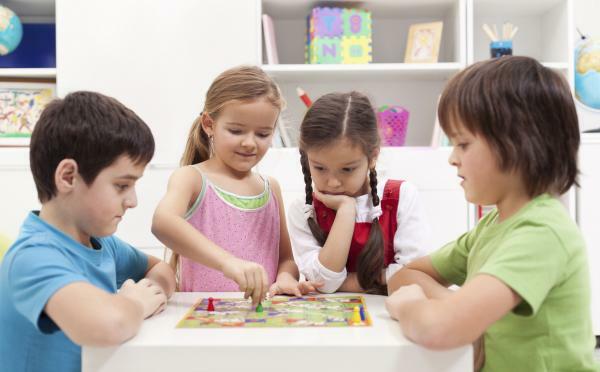
Emotional intelligence refers to the ability that allows us to control feelings and own emotions, in order to feel, understand and apply them by adapting them to different situations. It is about the intelligence that allows us to recognize the feelings and emotions both of our own and of other people, at the same time as enables us to motivate ourselves and adequately manage our emotions, which are directed both at ourselves and at the people who surround. Keep reading more about emotional intelligence in this Psychology-Online article: emotional intelligence in children.
Index
- What about emotional intelligence?
- Emotional intelligence in children with autism
- Emotional intelligence in gifted children
- Emotional intelligence in children with special educational needs
What about emotional intelligence?
Emotional intelligence comprises four areas of competence that we must take into account when evaluating or measuring people's emotional intelligence. The areas of emotional intelligence are:
1. Knowledge of one's own emotions and those of others
It is about the ability to recognize emotions and feelings both of oneself and of other people. On the one hand, this implies a introspection capacity and introvision that allows the person to be able to understand himself. On the other hand, recognizing other people's emotions and feelings implies a capacity for empathy and listening to people.
2. Self-control
Another area of competence of emotional intelligence is the management of one's own emotions and the ability to adapt the expression of these emotions depending on the moment, the situation, the context and / or the people around us.
3. Self motivation
The ability to motivate oneself is another of the areas of competence that we must take into account. This capacity implies that the person must submit to some objectives, goals or achievements. It is the capacity that allows the balance between gratification and impulsiveness, that is, when we want to achieve a goal we should not act impulsively to reach the gratification as soon as possible, but we must learn to control it in order to achieve it in a adequate.
4. Social skills
Finally, the last area of competence of emotional intelligence refers to the management of social relationships, a fact that implies know how to relate with the emotions and feelings of others, understanding and adapting the impact of our actions on others. If you want to know if you have these skills you can do the social skills test.
Emotional intelligence in children with autism.
Children with a autism spectrum disorder (ASD) present a deficit that shows a great difficulty understanding and expressing feelings and emotions both of themselves and of other people, whether expressed facially or orally (with the voice). In addition, we must bear in mind that children who suffer from this disorder also have persistent deficiencies in communication and social interaction, a fact that considerably affects their social relationships and interactions personal. For this reason, these children have difficulties in establishing emotional ties or ties with other people.
It is common for all this to lead us to think that children with autism cannot develop emotional intelligence, but is that true? There are several studies that show that children with this disorder do can develop emotional intelligence, but they will require more help compared to children who do not have this disorder. You must have a lot of patience and offer a lot help, guidelines and support these children, since they present problems to generalize learning, that is, if a child with autism learns in a theoretical meaning of emotions, will present difficulties to bring that learning to situations of his life everyday.
Currently, new technologies and other technological resources to promote the learning of these children in relation to emotions, communication, social skills, social relationships, among others.
Emotional intelligence in gifted children.
When we talk about emotional intelligence in gifted children we must take into account that these children are subjected to a higher level of stress Due to the high expectations that are generated around them, compared to their peers they do not gifted. Thus, there are two well differentiated conceptions in relation to emotional intelligence in gifted children.
- On the one hand, a research group demonstrate that gifted children present emotional problems and difficulties, of adaptability and social maladjustment. In addition, they show over-excitability, a fact that leads them to be overly sensitive before different areas, especially in the emotional area. For this reason, gifted children tend to be more likely to suffer from social adjustment problems, they are more sensitive to interpersonal conflict and experience higher levels of stress compared to other non-children gifted. Therefore, this conception defends that emotional intelligence in gifted children is affected.
- On the other hand, other research state that gifted children do not present the problems mentioned above, but are defined by a set of characteristics that allow them to be able to adjust emotionally, understand themselves and others and cope positively with conflict and stress. Among these characteristics we find a good social and emotional adjustment, moral development, maturity to engage in social relationships, greater mental flexibility, emotional resilience, ability to think positive, among others. Therefore, this option postulates that emotional intelligence in gifted children is high.
To assess emotional intelligence, a emotional intelligence test.
Emotional intelligence in children with special educational needs.
There is a relationship between emotional intelligence and academic performance. Thus, children with high emotional intelligence tend to get better grades. and academic achievements in the different subjects, thanks to its greater regulatory capacity emotional.
Refering to emotional intelligence In children with special educational needs, in many cases, children with special educational needs present problems of social maladjustment, demotivation, deficient socio-affective dimension and little family control. In addition, the more unstructured the socio-family environment, the greater the probability that the child develop alterations and / or personal maladjustments that hinder their process of social, school and family. Therefore, professionals must contribute to promoting equal opportunities with respect to other children and guarantee attention to the most vulnerable students To improve their training and prevent the risks of social exclusion, a fact that requires that the personal and social circumstances of each student be taken into account by the teaching staff.
In general, the development of emotions and its understanding is a continuous and progressive process of learning in all children, with and without special educational needs. Thus, in the case of children with special educational needs, it is necessary to pay special attention to emotional behavior, to control their reactions and to establish their social relationships.
In spite of everything, we must understand that this creates great difficulty for teachers, since each student demands answers different educational programs and must attend adequately and adapt to each of these students taking into account their differences individual. Especially to develop emotional intelligence in children with special educational needs.
This article is merely informative, in Psychology-Online we do not have the power to make a diagnosis or recommend a treatment. We invite you to go to a psychologist to treat your particular case.
If you want to read more articles similar to Emotional intelligence in children, we recommend that you enter our category of Emotional and behavioral disorders.
Bibliography
- Jiménez, A. (2018). Emotional intelligence. In: AEPap (ed.). Pediatrics Update Course 2018. Madrid: Lúa Ediciones 3.0, 457-469
- Miguel, A.M. (2006). The world of emotions in autistics. Electronic Journal Theory of Education. Education and Culture in the Information Society, 7 (2), 169-183.
- Pegalajar, M.C., and Colmenero, M.J. (2013). IEmotional intelligence in students with educational compensation needs. Open Classroom, 41 (3), 33-44.
- Prieto, M.D., Ferrándiz, C., Ferrando, M., Sánchez, C., and Bermejo, R. (2008). Emotional intelligence and high ability. Spanish Journal of Pedagogy, (240), 241-260.


